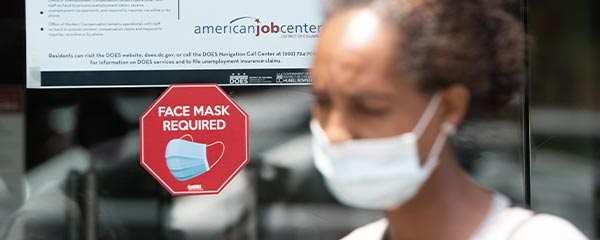Story Highlights
- 66% in U.S. dissatisfied, including 21% who are "very dissatisfied"
- 71% willing to get COVID-19 vaccine, including 9% who already have
- Republicans least likely demographic group willing to be vaccinated
WASHINGTON, D.C. -- As the Biden administration begins to grapple with the COVID-19 situation, two-thirds of Americans say they are not satisfied with the way the vaccination process is going in the U.S. This includes 21% who are "very dissatisfied." At the same time, 34% are satisfied, with 4% of them "very satisfied."
Meanwhile, 71% of Americans are now willing to be vaccinated, up from 65% in late December and the highest recorded since July, when the measure was first included in Gallup's probability-based online tracking survey. The current figure includes 62% who say they would be willing to be vaccinated if it were available to them right now at no cost and 9% who say they have already received at least one of the two doses needed to be fully inoculated. Those resistant to receiving the vaccine remain divided in their reasons for not doing so, but concerns about its safety and a general distrust of vaccines are chief among them.
Dissatisfaction With Vaccine Process Is High
The question gauging satisfaction with the vaccine process was included for the first time in the Jan. 25-31 survey. During the survey's field period, President Joe Biden addressed the nation's vaccine supply shortfall by announcing an increase in the number of doses the government was purchasing. The Biden administration also began work on an aggressive national distribution plan.
As with most other COVID-19 measures, partisans' satisfaction levels with the vaccination process diverge. Republicans are about evenly divided, with 49% satisfied and 51% dissatisfied, while Democrats (79%) and independents (63%) are largely dissatisfied. These differences suggest people may still be evaluating the situation based on their assessments of former President Donald Trump's handling of the vaccination effort, rather than Biden's, given Democrats' and independents' general discontent with the Trump administration's handling of the coronavirus situation more generally.
| U.S. adults | Republicans | Independents | Democrats | ||||||||||||||||||||||||||||||||||||||||||||||||||||||||||||||||||||||||||||||||||||||||||||||||
|---|---|---|---|---|---|---|---|---|---|---|---|---|---|---|---|---|---|---|---|---|---|---|---|---|---|---|---|---|---|---|---|---|---|---|---|---|---|---|---|---|---|---|---|---|---|---|---|---|---|---|---|---|---|---|---|---|---|---|---|---|---|---|---|---|---|---|---|---|---|---|---|---|---|---|---|---|---|---|---|---|---|---|---|---|---|---|---|---|---|---|---|---|---|---|---|---|---|---|---|
| % | % | % | % | ||||||||||||||||||||||||||||||||||||||||||||||||||||||||||||||||||||||||||||||||||||||||||||||||
| Very satisfied | 4 | 7 | 5 | 2 | |||||||||||||||||||||||||||||||||||||||||||||||||||||||||||||||||||||||||||||||||||||||||||||||
| Satisfied | 30 | 42 | 32 | 20 | |||||||||||||||||||||||||||||||||||||||||||||||||||||||||||||||||||||||||||||||||||||||||||||||
| Dissatisfied | 45 | 33 | 41 | 57 | |||||||||||||||||||||||||||||||||||||||||||||||||||||||||||||||||||||||||||||||||||||||||||||||
| Very dissatisfied | 21 | 18 | 22 | 22 | |||||||||||||||||||||||||||||||||||||||||||||||||||||||||||||||||||||||||||||||||||||||||||||||
| Total satisfied | 34 | 49 | 37 | 22 | |||||||||||||||||||||||||||||||||||||||||||||||||||||||||||||||||||||||||||||||||||||||||||||||
| Total dissatisfied | 66 | 51 | 63 | 79 | |||||||||||||||||||||||||||||||||||||||||||||||||||||||||||||||||||||||||||||||||||||||||||||||
| 优蜜传媒Panel, Jan. 25-31, 2021 | |||||||||||||||||||||||||||||||||||||||||||||||||||||||||||||||||||||||||||||||||||||||||||||||||||
Willingness to Be Vaccinated Rises as Americans Begin to Receive Shots
Americans' willingness to receive the COVID-19 vaccine continues on an upward trajectory since hitting a low of 50% in September. The latest 71% of U.S. adults who are willing to be vaccinated is the highest on record and the first measurement that includes a reading for those who have already been vaccinated.

Line graph. Americans' willingness to receive a COVID-19 vaccination that has been approved by the FDA since late July. Currently, 71% say they are willing to receive one, and 29% say they will not. This includes 9% who have already received at least one dose of the vaccine. The previous high was 66% in July and the low was 50% reading in September.
Democrats' Vaccine Willingness Rises
Democrats' willingness to be vaccinated has risen eight percentage points since late December, and Republicans' is up six points. The 91% of Democrats and 51% of Republicans willing to be immunized are the highest percentages to date for each group. Independents' views are roughly in line with recent readings, tying that group's high recorded in November.
Among Democrats, the overall 91% includes 12% who have already received at least one shot; fewer Republicans (7%) and independents (8%) say they have been vaccinated.

Line graph. Percentage of partisans who are willing to receive the COVID-19 vaccine or have already received it. Currently, 91% of Democrats, 61% of independents and 51% of Republicans are in that category. Each is the highest reading for that group since the question was first asked in July.
Differences in Vaccine Views by Age, Income, Education, Region
Aside from Republicans, substantial majorities in all major demographic groups express willingness to be vaccinated. Yet, significant differences persist within several subgroups:
- The oldest and youngest adults are the most likely age groups to express willingness to be vaccinated. Middle-aged Americans (aged 45 to 64) remain the least willing. Fourteen percent of adults aged 65 and older, who are among one of the first groups the Centers for Disease Control and Prevention has recommended receive the vaccine, are the most likely of all demographic groups to have already done so.
- Americans with an annual household income of $90,000 or more are the most likely to express willingness to be immunized among the three income groups.
- Adults with a college degree are much more likely than those without to say they would get a COVID-19 vaccine or have already done so.
- Americans living in the Northeast are the most willing to say they would like to receive the vaccine but are the least likely to have done so.
| Have already received vaccine | Combined: Willing to receive/Have already received | |||||||||||||||||||||||||||||||||||||||||||||||||||||||||||||||||||||||||||||||||||||||||||||||||||
|---|---|---|---|---|---|---|---|---|---|---|---|---|---|---|---|---|---|---|---|---|---|---|---|---|---|---|---|---|---|---|---|---|---|---|---|---|---|---|---|---|---|---|---|---|---|---|---|---|---|---|---|---|---|---|---|---|---|---|---|---|---|---|---|---|---|---|---|---|---|---|---|---|---|---|---|---|---|---|---|---|---|---|---|---|---|---|---|---|---|---|---|---|---|---|---|---|---|---|---|---|
| % | % | |||||||||||||||||||||||||||||||||||||||||||||||||||||||||||||||||||||||||||||||||||||||||||||||||||
| U.S. adults | 9 | 71 | ||||||||||||||||||||||||||||||||||||||||||||||||||||||||||||||||||||||||||||||||||||||||||||||||||
| Gender | ||||||||||||||||||||||||||||||||||||||||||||||||||||||||||||||||||||||||||||||||||||||||||||||||||||
| Men | 7 | 69 | ||||||||||||||||||||||||||||||||||||||||||||||||||||||||||||||||||||||||||||||||||||||||||||||||||
| Women | 11 | 72 | ||||||||||||||||||||||||||||||||||||||||||||||||||||||||||||||||||||||||||||||||||||||||||||||||||
| Age | ||||||||||||||||||||||||||||||||||||||||||||||||||||||||||||||||||||||||||||||||||||||||||||||||||||
| 18-44 | 10 | 73 | ||||||||||||||||||||||||||||||||||||||||||||||||||||||||||||||||||||||||||||||||||||||||||||||||||
| 45-64 | 6 | 63 | ||||||||||||||||||||||||||||||||||||||||||||||||||||||||||||||||||||||||||||||||||||||||||||||||||
| 65+ | 14 | 80 | ||||||||||||||||||||||||||||||||||||||||||||||||||||||||||||||||||||||||||||||||||||||||||||||||||
| Race | ||||||||||||||||||||||||||||||||||||||||||||||||||||||||||||||||||||||||||||||||||||||||||||||||||||
| White adults | 10 | 71 | ||||||||||||||||||||||||||||||||||||||||||||||||||||||||||||||||||||||||||||||||||||||||||||||||||
| Non-White adults | 8 | 72 | ||||||||||||||||||||||||||||||||||||||||||||||||||||||||||||||||||||||||||||||||||||||||||||||||||
| Party identification | ||||||||||||||||||||||||||||||||||||||||||||||||||||||||||||||||||||||||||||||||||||||||||||||||||||
| Republicans | 7 | 51 | ||||||||||||||||||||||||||||||||||||||||||||||||||||||||||||||||||||||||||||||||||||||||||||||||||
| Independents | 8 | 61 | ||||||||||||||||||||||||||||||||||||||||||||||||||||||||||||||||||||||||||||||||||||||||||||||||||
| Democrats | 12 | 91 | ||||||||||||||||||||||||||||||||||||||||||||||||||||||||||||||||||||||||||||||||||||||||||||||||||
| Education | ||||||||||||||||||||||||||||||||||||||||||||||||||||||||||||||||||||||||||||||||||||||||||||||||||||
| College graduate | 13 | 84 | ||||||||||||||||||||||||||||||||||||||||||||||||||||||||||||||||||||||||||||||||||||||||||||||||||
| Not college graduate | 8 | 66 | ||||||||||||||||||||||||||||||||||||||||||||||||||||||||||||||||||||||||||||||||||||||||||||||||||
| Annual household income | ||||||||||||||||||||||||||||||||||||||||||||||||||||||||||||||||||||||||||||||||||||||||||||||||||||
| <$36,000 | 6 | 67 | ||||||||||||||||||||||||||||||||||||||||||||||||||||||||||||||||||||||||||||||||||||||||||||||||||
| $36,000-<$90,000 | 10 | 69 | ||||||||||||||||||||||||||||||||||||||||||||||||||||||||||||||||||||||||||||||||||||||||||||||||||
| $90,000+ | 10 | 76 | ||||||||||||||||||||||||||||||||||||||||||||||||||||||||||||||||||||||||||||||||||||||||||||||||||
| U.S. region | ||||||||||||||||||||||||||||||||||||||||||||||||||||||||||||||||||||||||||||||||||||||||||||||||||||
| Northeast | 6 | 78 | ||||||||||||||||||||||||||||||||||||||||||||||||||||||||||||||||||||||||||||||||||||||||||||||||||
| Midwest | 8 | 69 | ||||||||||||||||||||||||||||||||||||||||||||||||||||||||||||||||||||||||||||||||||||||||||||||||||
| South | 11 | 68 | ||||||||||||||||||||||||||||||||||||||||||||||||||||||||||||||||||||||||||||||||||||||||||||||||||
| West | 10 | 72 | ||||||||||||||||||||||||||||||||||||||||||||||||||||||||||||||||||||||||||||||||||||||||||||||||||
| 优蜜传媒Panel, Jan. 25-31, 2021 | ||||||||||||||||||||||||||||||||||||||||||||||||||||||||||||||||||||||||||||||||||||||||||||||||||||
Reasons Americans Are Reluctant to Get COVID-19 Vaccine
Asked for the main reason behind their reluctance, those who are unwilling to receive a COVID-19 vaccine are most likely to say they have concerns about the rushed timeline (25%). However, the percentage giving this response has dropped by 12 points since the question was last asked in the fall. Twenty-two percent say they want to wait and confirm it is safe, 16% say they do not trust vaccines in general, and 9% want to see how effective it is.
Another 28% cite other reasons, including views that the risks of the virus are overblown, a belief that they already have COVID-19 antibodies, concerns about adverse reactions to the vaccine and a general distrust of the government.
| Oct 19-Nov 1, 2020 | Jan 25-31, 2021 | ||||||||||||||||||||||||||||||||||||||||||||||||||||||||||||||||||||||||||||||||||||||||||||||||||
|---|---|---|---|---|---|---|---|---|---|---|---|---|---|---|---|---|---|---|---|---|---|---|---|---|---|---|---|---|---|---|---|---|---|---|---|---|---|---|---|---|---|---|---|---|---|---|---|---|---|---|---|---|---|---|---|---|---|---|---|---|---|---|---|---|---|---|---|---|---|---|---|---|---|---|---|---|---|---|---|---|---|---|---|---|---|---|---|---|---|---|---|---|---|---|---|---|---|---|---|
| % | % | ||||||||||||||||||||||||||||||||||||||||||||||||||||||||||||||||||||||||||||||||||||||||||||||||||
| Concerns about rushed timeline | 37 | 25 | |||||||||||||||||||||||||||||||||||||||||||||||||||||||||||||||||||||||||||||||||||||||||||||||||
| Want to wait to confirm it is safe | 26 | 22 | |||||||||||||||||||||||||||||||||||||||||||||||||||||||||||||||||||||||||||||||||||||||||||||||||
| Don't trust vaccines generally | 12 | 16 | |||||||||||||||||||||||||||||||||||||||||||||||||||||||||||||||||||||||||||||||||||||||||||||||||
| Want to wait to see how effective it is | 10 | 9 | |||||||||||||||||||||||||||||||||||||||||||||||||||||||||||||||||||||||||||||||||||||||||||||||||
| Other reason | 15 | 28 | |||||||||||||||||||||||||||||||||||||||||||||||||||||||||||||||||||||||||||||||||||||||||||||||||
| Among those who say they would not be vaccinated | |||||||||||||||||||||||||||||||||||||||||||||||||||||||||||||||||||||||||||||||||||||||||||||||||||
| 优蜜传媒Panel | |||||||||||||||||||||||||||||||||||||||||||||||||||||||||||||||||||||||||||||||||||||||||||||||||||
Bottom Line
At the beginning of Joe Biden's presidency, Americans are largely dissatisfied with the rollout of the COVID-19 vaccine thus far, perhaps reflecting residual concerns with the Trump administration's handling of the situation. The public is increasingly willing to be immunized, largely reflecting Democrats' increased comfort with the vaccine, and the Biden administration is working to make more doses available.
Johnson & Johnson has submitted an application to the Food and Drug Administration for emergency use authorization of its single-shot vaccine, and AstraZeneca and Novavax are expected to do the same this spring. If approved, they would go a long way toward increasing the supply chain that is needed to address the growing demand.
Learn more about how the works.




